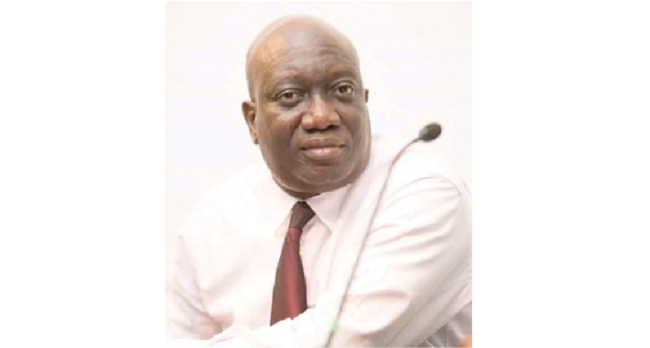

Dr Femi Adebajo is a consultant psychiatrist with a special interest in sleep disorders at the Royal Cornhill Hospital in Aberdeen, United Kingdom (UK). In this interview with SADE OGUNTOLA, he talks about the importance of sleep and why resting does not necessarily mean sleeping. Excerpts:
CHILDREN need good sleep for brain development, so sleep intervention might be needed to help improve mental and behavioural health during pre-adolescence and beyond. What is your perspective on this?

There is robust scientific evidence linking brain development, especially in adolescence, with both the total quantity of sleep and the distribution of that sleep. By distribution, I mean the circadian rhythm, which is essentially 23 and a half hours in which you have alternating periods of rest. That is the body clock. It is known that the body clocks of adolescents differ from those of adults, so their need for sleep is greater than that of older people. Also, they need that sleep at specific times, and often, the regular school schedule interferes with that natural rhythm.
Unfortunately for a lot of adolescents, their school commitments essentially interfere with the time they should be sleeping and can get that rhythm distorted. So, just as inadequate sleep is potentially harmful, so is the reduction in total length of sleep.

Can poor sleep increase an individual’s vulnerability to mental and behavioural problems?

Not just mental health but also physical health, because sleep is a phase of life where you repair tissues and reinforce memory, essentially converting short-term memory to long-term memory. So, there are implications for physical health, mental health, or social wellbeing in the quality of sleep that all of us have, but especially in adolescence because brains grow faster during that period.
Will you then suggest a catch-up for them at weekends?
Certainly, not just a catch-up during the week; I think there should be serious thought given to the adjustment of school hours. I don’t know how practical that might be because parents also have to go out to work. But the school time, as it currently works, is probably not the best for the sleep requirements of children, especially older children and adolescents. It may be prudent to consider splitting the school day or starting school later so that they can actually have the opportunity to sleep longer, especially during the nighttime hours when their neuro-chemical cues indicate that they should be sleeping.
How about ensuring that they sleep very early, so that we can wake them up very early for school? Will that be okay?
Ideally, children should be getting about eight to nine hours of sleep daily. But sleep is also best in the dark hours because that is the peak period for melatonin secretion, which is one of the important hormones in regulating sleep.
What constitutes healthy sleep?
Healthy sleep really is one that is of sufficient quantity and quality to perform the primary functions of sleep, which are to provide rest for the brain and other vital structures. During sleep, short-term memory is converted to long-term memory and that’s why people who don’t sleep well tend to have memory lapses. So the purpose of sleep is best achieved when it is of the right amount, quality and at the appropriate time of the day. When you go to sleep and wake up feeling refreshed, that’s when you know you’ve had enough sleep and have rested. If you wake up and you feel tired or like you should probably go back to bed again, then you probably have not had the right quantity or quality of sleep.
What are you then supposed to do if you wake up feeling tired or probably wanting to go back to bed again?
Well, this is the difficult part; we often are not masters of our fate and that means sometimes the fulfillment of your needs is tempered by your ability to meet them. For example, you may have a job that requires you to get up at 5.00 a.m. after getting home at 1.00 a.m. Of course, you’re not getting enough sleep, but you may not be able to control that. But whenever you can, that is what you should do. It may mean that you spend more time doing catch-up sleep. Perhaps it would be a good idea to spend extra time in bed during the weekend. So it may not be prudent, for example, to work all through the week and then go to parties and church all day on Saturday and Sunday, which means you simply have no rest for seven days.
How best and of what importance is healthy sleep in coping with the many negative conditions like wars, pestilence and outbreaks of diseases prevailing across the world?
First, one of the basic requirements of sleep is to be able to relax and actually be ready for shutting down, which is really what sleep is. The brain shuts down, and the organs slow down. If you can’t relax properly and be relatively at ease, it is difficult to sleep well. It is important to ensure that the surrounding environment is conducive to sleep — that it, the right temperature, the right sound levels, and the right light levels. All those environmental factors need to come together for you to get good sleep, and, of course, you’re not always able to control all of them. You may not be able to sleep because there’s a church or mosque nearby having an all-night vigil, or there is the noise from the traffic down the road, and so on and so forth. But wherever we can, we should deliberately seek to create optimum conditions for sleep.
Can individuals resort to using sleeping pills to deliberately make them sleep? Is that advisable?
Certainly if a sleeping pill or sedative is used, it should not be without a prescription as part of a treatment plan. Even that shouldn’t be the first or second choice for intervention. As much as possible, what we suggest is to take sleep hygiene measures and improve the conditions in which you sleep. If, for example, it is hot where you are sleeping, try to make it cooler if you can; if it’s dusty, try to make it less dusty; and if it’s noisy, try to ameliorate it by wearing earplugs to get some respite from the noise coming from outside.
Essentially, identify the things that you do that make sleep less likely: stimulants, watching TV in bed, using the telephone, or anything that has bright screens at night. As much as possible, make your bed a place where you do nothing but sleep. Again, those sleep hygiene measures are simple but tremendously effective. And then, of course, you combine that with reducing the things that make you not sleep. For example, stimulants like tea, coffee and alcohol are essentially sleep reducers. If those don’t work, then, of course, there might be room for using sedatives for a short time, but they should really be the last resort.
How true is it that sleep can cut life short or increase the risk of cardiovascular diseases?
It is very true that sleep is associated directly with an increased risk of infections, cardiovascular, respiratory, and mental disorders and, of course, ailments like hypertension, anxiety and depression worsen because of poor sleep. So the effects of poor sleep are felt across the whole range of body systems and functions. Even from the analogy of mechanical engineering, if a car is used all the time and it’s not properly serviced, it will eventually break down. That analogy holds true for biological systems too. Sleep is the next phase of repair.
The ideal duration of sleep is actually a range, and it varies with age; older people generally need fewer hours of sleep. Newborns sleep for very long, often up to 22 to 23 hours a day, because they need it. But as they get older, they need less and less sleep and, at the other extreme of age, you need less sleep.
So actually, people worry unnecessarily about not getting enough sleep; it is a wrong notion that everybody needs eight hours of sleep at night. That’s not true. Younger children need more, and older people need less. Again, the right amount of sleep for each individual is the amount of sleep that you get that makes you wake up feeling refreshed.
As a psychiatrist, what’s the link between sleep and mental health?
Well, there is a distinct connection. A lot of mental disorders are affected by sleep in a two-way relationship; it could be a cause as well as an effect of a mental health disorder. Sleep disorders can manifest as mental disorders. For example, if you don’t sleep well chronically, you may start to have problems like anxiety and depression. Impaired sleep — for example, insomnia — might also be a symptom of certain mental disorders, like depression and schizophrenia.
People say that while asleep they feel as if something is weighing them down; some assume that it is a spiritual attack. What is your opinion about this?
Of course, Nigeria is a very superstitious society, so any issue or observation we have, we tend to attribute it to supernatural causes rather than investigate it scientifically and rationally. I think there is not a lot of substance to it. I think many of those are manifestations of personal neurosis in people who are anxious. You are anxious, and you feel a weight on your chest. You then conclude that somebody is pressing you down during your dreams. I see no evidence for that. If I see evidence, I will believe it.
Certainly, there are a lot of common sayings that are wrong. People believe, for example, that somebody can be possessed by demons. Nobody has ever shown us any evidence of anyone being possessed by demons, but people say it all the time. So wrong beliefs can be widely spread, and lots of people can be wrong.
Many people assume that sleep is not a big issue; it is common, so sleep problems are not supposed to be given any importance. How right are they?
True, but it is like saying you want to talk to a lot of people about high blood pressure, and other people will say that it is not a big deal at all. They instantly give recipes for raising blood pressure. It is like casting a net; sometimes you will catch some fish. Sometimes you won’t catch any fish. But if you put information out there, people will start to think about it. First, you increase awareness, and then people will be able to ask questions, and you increase overall knowledge in society.
At the same time as you’re putting information out there and demystifying some of these myths about sleep, you are improving your overall knowledge about sleep, and this will invariably ensure a healthy community. Like I sometimes tell people, if you go out at 6 a.m. and come back at 10 p.m., having spent a total of maybe five hours in traffic and working the full day, it is natural that you are tired and you may feel achy. The solution to that is not to take painkillers but to take simpler measures like acknowledging that your body is a biological system that needs rest. You can take a shower and try to get to sleep. If you cannot get sleep during the week, get it during the weekend when you can.
From your perspective, what does rest mean?
Rest just means that you’re not doing anything physically active. You are deliberately resting your physical body. So, you are not moving around so much, you’re not talking so much, and you are not communicating so much. You are simply slowing down, and that’s important.
Often people are told to go and rest, but you cannot sleep all day long? But sometimes, just lying down for 30 minutes doing nothing, just relaxing and breathing; watching your breathing while you are just calming down is good. So, each individual has to decide whether their lifestyle is sustainable or not, whether it’s positive or harmful, and if it is, then they should do something about it.
READ ALSO FROM NIGERIAN TRIBUNE








